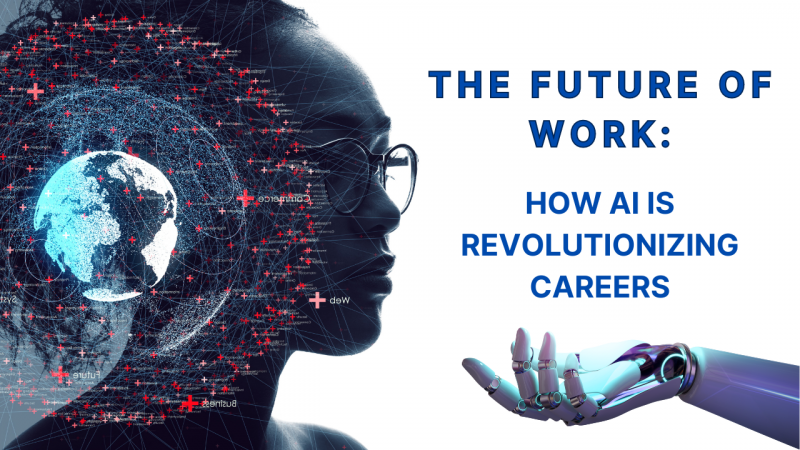The Future of Work: How AI is Revolutionizing Careers
Introduction to the AI Era:
In a time where efficiency is paramount and speed is essential, Is the notion of AI completely replacing human intelligence still up for debate? As we delve deeper into the 21st century, industries worldwide are undergoing profound transformations.
AI is revolutionizing careers and our interactions with technology, consequently reshaping the job market. In this blog series, we will examine how professionals are adapting to thrive in an increasingly automated and data-driven world.
Shifting Job Landscape:
The increasing influence of AI prompts the question: How will it affect the current job market? Will it lead to the demise of traditionally prevalent jobs?
While AI certainly has the capability to automate repetitive or data-driven tasks, its emergence does not imply the extinction of jobs but rather a transformation in the nature of work.
According to PwC’s Global Artificial Intelligence Study: Exploiting the AI Revolution, AI could contribute up to $15.7 trillion to the global economy by 2030. Automation has already made its way to the manufacturing industry with robots taking over the assembly line. The Customer Service industry has also seen a change with the increasing use of AI powered chatbots and virtual assistants.
However, amidst the decline of traditional roles, a simultaneous rise in new, time-relevant jobs is observed.
Here are some key trends highlighting the impact of AI on employment:
1. Reshaping job roles:
Automation targets routine and repetitive tasks, potentially reshaping job roles. Employees increasingly collaborate with AI systems to boost overall productivity and efficiency.
2. Demand for new skills:
The integration of AI necessitates a workforce equipped with new skills. Jobs are being created in the fields of data science, machine learning, and AI development, which reflects a demand for expertise in managing, maintaining, and advancing AI technologies.
3. AI as a Productivity Booster:
AI acts as a force multiplier, allowing humans to focus on higher-order tasks that require creativity, critical thinking, and emotional intelligence. Rather than replacing workers, it attempts to increase the quality of work done and in turn increase productivity.
4. Shift in Industry Dynamics:
As AI technology continues to revolutionize careers, the retail sector is undergoing a significant transformation. Retailers are leveraging AI-driven solutions for personalized customer experiences, dynamic pricing strategies, and inventory management.
This shift is driving the creation of new roles in areas such as AI-driven marketing analysts, e-commerce optimization specialists, and supply chain AI strategists.
5. AI-Powered Entrepreneurship:
AI technologies have opened gates for entrepreneurs, enabling them to explore new business opportunities. Startups are emerging in sectors such as AI consulting, customization of AI solutions for niche markets, and AI-driven innovations, fostering economic growth and job creation.
6. Job Quality vs. Quantity:
There’s a growing emphasis on the quality of employment over sheer quantity. AI’s ability to automate repetitive tasks holds the promise of improving job quality by freeing up time for employees to focus on more meaningful and fulfilling work.
Upskilling and Reskilling:
In order to thrive in the constantly evolving professional landscape, it’s essential to stay abreast of emerging technologies and remain dedicated to lifelong learning. In these times of excessive disruption, when a large number of people are losing their jobs due to lack of knowledge and because they are unable to keep up with the new technologies, many companies are now reskilling their employees to soften the blow of layoffs.
57 percent of U.S. workers want to update their skills, and 48 percent would consider switching jobs to do it. In addition, 71 percent of workers say job training and development increase their job satisfaction, and 61 percent say upskilling opportunities are an important reason to stay at their job.
Remote Work and Gig Economy:
The gig economy and AI are closely intertwined, shaping the future of work. Gig workers, often found on platforms like Truelancer, thrive on short-term contracts facilitated by online connections. AI empowers these workers by enhancing efficiency, allowing them to accomplish more in less time.
This newfound freedom allows individuals to choose freelance work over traditional employment, as they can utilize AI tools to expedite task completion and optimize their productivity.
For instance, a freelance content writer utilizes AI to streamline writing processes, delivering quality work within deadlines and receiving full compensation promptly.
Future Outlook:
“As AI becomes more prevalent in the workplace, the focus should be on how we can harness its power to enhance human creativity and innovation.” – Sundar Pichai.
The future of work is driven by automation, the rise of the gig economy, and the increasing prevalence of remote work.
While automation is expected to replace traditional jobs, the gig economy is gaining traction due to its promise of greater flexibility and independence. Additionally, remote work is becoming more prevalent thanks to technological advancements that facilitate collaboration and communication from any location.
To succeed in this evolving environment where AI is revolutionizing careers, individuals and organizations must adapt to these emerging trends and embrace innovative technologies and work models.
